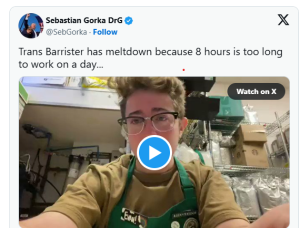A recent video showing a Starbucks barista in tears over being scheduled for an 8-hour shift has gone viral, sparking a powerful conversation about work-life balance, employee treatment, and burnout in the service industry. The emotional clip, shared on social media, reveals the human side of fast-paced retail jobs—and reminds us that behind every cup of coffee is a person navigating long hours, demanding customers, and sometimes inadequate support.
The barista’s breakdown wasn’t just about the length of the shift—it was about feeling unheard, undervalued, and overwhelmed by the pressures of working in customer service without proper rest or flexibility.
What Happened?
In the now-viral video, a visibly upset Starbucks barista opens up about their experience at work, particularly focusing on the stress of being scheduled for an extended 8-hour shift with little time to recover between shifts. As they speak, it becomes clear that this moment was the culmination of many frustrations—long hours, unpredictable scheduling, and difficult interactions with customers.
While some viewers initially questioned whether an 8-hour shift alone could be so overwhelming, others quickly recognized the deeper issues at play: fatigue, lack of breaks, poor communication, and the mental toll of constant customer-facing pressure.

Public Reaction: Empathy, Outrage, and Mixed Opinions
As expected, the post sparked a wide range of reactions from across the internet. Many empathized deeply with the worker, sharing similar experiences from their own time in the service industry.
Voices of Support:
One commenter, @coffeequeen, who had worked in food service for several years, wrote:
“I’ve been there. Long shifts, rude customers, and no control over your schedule. It wears you down. Employers need to start listening and offering real support.”
Others chimed in with stories of their own—of managers who failed to accommodate personal needs, of understaffing leading to exhaustion, and of emotionally draining days where dealing with customers felt like walking into battle.
Voices of Skepticism:
Some responses were less sympathetic. User @customerfirst replied:
“Working 8 hours isn’t unreasonable. People in manufacturing or healthcare work longer. They should be grateful for the job.”
This comment reflects a common but often tone-deaf sentiment—that any job should be endured regardless of conditions simply because “someone else would take it.”
The Bigger Picture: Burnout in the Service Industry
While opinions varied, one thing became clear: this incident struck a nerve.
Customer service roles are often underestimated in terms of emotional labor. Employees are required to maintain a smile and professional demeanor while managing long lines, complex orders, and occasionally hostile customers. Add to that unpredictable schedules, short-staffing, and limited opportunities for feedback, and it’s easy to see how burnout can creep in quietly—until it explodes.
According to reports and studies, emotional exhaustion is a major factor in high turnover rates in the service sector. When employees feel overworked and under-supported, the results can be devastating—not just for morale, but for mental health.
Management’s Response: A Step Toward Improvement
In response to the growing attention, the manager of the location involved released a public statement acknowledging the situation and committing to better practices moving forward. Part of the statement read:
“We take our responsibility as employers seriously and are committed to creating a positive and supportive work environment for all of our employees.”
This kind of acknowledgment is rare and refreshing. More importantly, it signals that management is open to feedback—an essential ingredient in building healthier workplace culture.
It’s not enough to say sorry, though. Real change comes when leadership listens, adjusts policies, and empowers employees to voice concerns before reaching breaking point.
What This Incident Reveals About Work Culture
The Starbucks video serves as a microcosm of larger issues in today’s workforce, especially in the service industry:
1. Emotional Labor Is Real
Service workers are constantly managing emotions—both their own and those of customers. This takes a psychological toll that’s often overlooked.
2. Scheduling Practices Need Reform
Unpredictable or overly long shifts without notice or input can lead to exhaustion and resentment. Workers deserve stable, predictable, and manageable schedules.
3. Mental Health Matters
Employers must begin treating mental well-being with the same seriousness as physical safety. Emotional breakdowns shouldn’t be normalized—they should be prevented.
4. Employees Want to Be Heard
The most important takeaway may be that workers don’t just want fair pay and reasonable hours—they want to know their voices matter.
Moving Forward: What Can Be Done?
This moment offers a chance for both employers and employees to reflect and respond constructively.
For Employers:
- Implement flexible scheduling options
- Offer mental health resources and check-ins
- Train managers in empathetic leadership
- Create systems where employees can submit feedback anonymously
- Recognize that burnout is preventable with proactive support
For Customers:
- Show gratitude and patience —small kindnesses go a long way
- Speak up if you witness mistreatment of staff
- Support businesses that prioritize fair treatment of employees
The viral video of the tearful Starbucks barista is more than just a glimpse into a tough day at work—it’s a wake-up call. It shows that even seemingly “simple” jobs carry heavy emotional weight, and that empathy and support from management can make all the difference.
If we truly value our service workers, we must move beyond sympathy and toward systemic change—better scheduling, improved communication, and a stronger commitment to mental wellness in the workplace.






